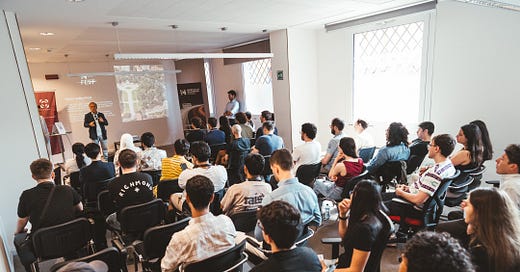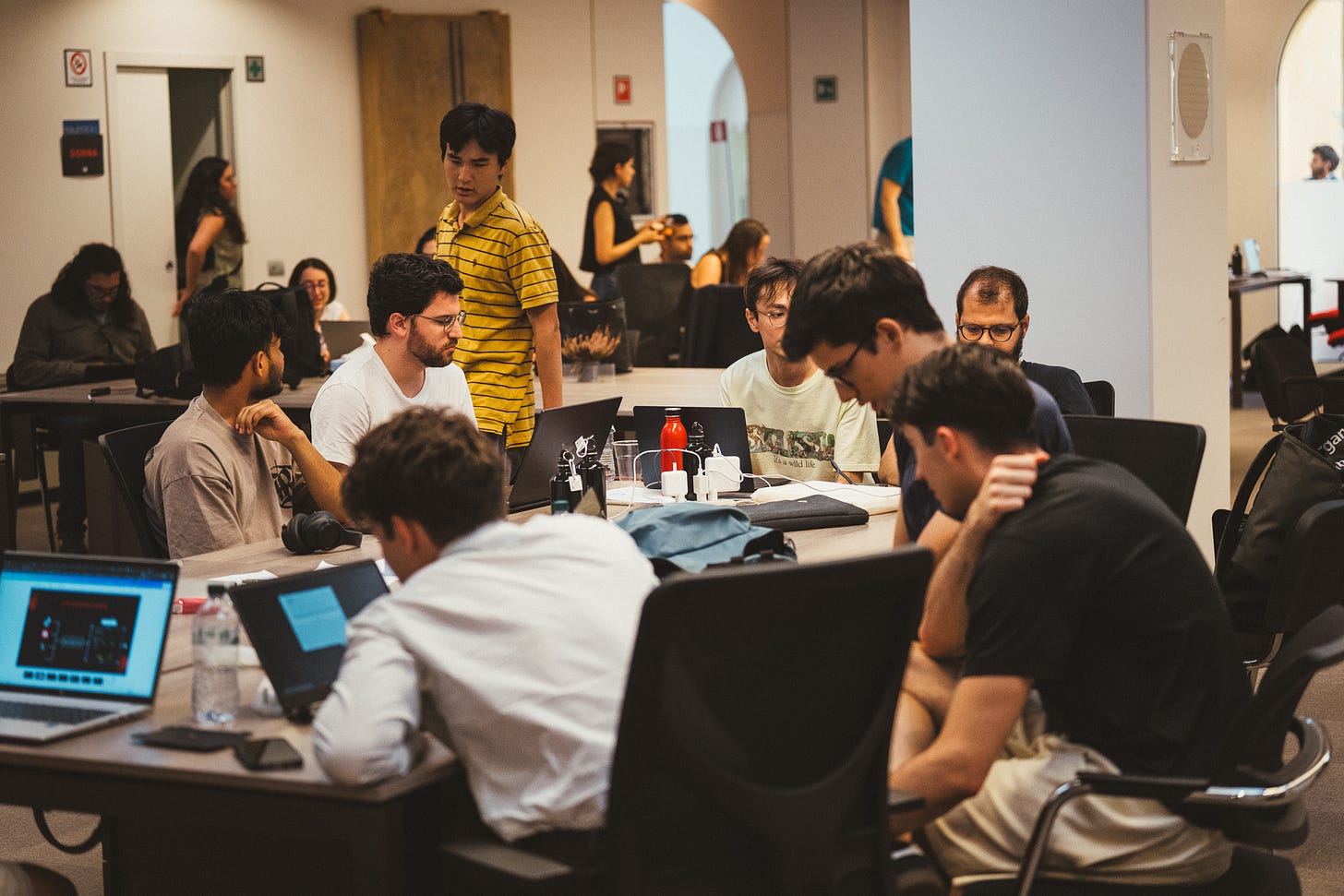The Motor Valley Fest Hackathon: Challenging next-gen talents on data & digital engagement in classic cars
The first Hackathon organized by AssetClassic, hosted during the 2025 Motor Valley Fest in Modena, reflects a broader shift underway in the classic car sector, one where data, sentiment analysis, and digital tools are beginning to complement traditional know-how. The two-day event, sponsored by TikTok and developed in partnership with the Motor Valley Accelerator, brought together young talent to explore how real-time sentiment and long-term valuation trends can be integrated to support more informed decisions by collectors, investors, and institutions.
The decision to host the Hackathon in Modena was a natural one, given the unique ecosystem the city is part of. The Emilia-Romagna region, and particularly the district known as the Motor Valley, is one of the most concentrated and historically significant automotive hubs globally. Spanning from Piacenza to Rimini along the Via Emilia, the Motor Valley is home to multiple high-profile OEMs, including Ferrari, Lamborghini, Maserati, Ducati, Dallara, and Pagani, as well as a network of specialized suppliers, technical institutes, and restoration firms.
Contributing to this industrial and cultural richness is the Motorvehicle University of Emilia-Romagna (MUNER), a consortium of four leading Italian universities (Bologna, Ferrara, Modena and Reggio Emilia, and Parma) established in collaboration with top Motor Valley brands such as Dallara, Ferrari, Lamborghini, and Ducati. Launched in 2017, MUNER was created to train the next generation of engineers and specialists in high-performance automotive systems, combining academic rigor with direct industrial engagement. It now attracts students from around the world, many of whom go on to work across the Motor Valley ecosystem in roles spanning design, R&D, and manufacturing.
Building on this academic foundation, MUNER recently joined forces with Bologna Business School (BBS) to launch the world’s first MBA in Supercars, Superbikes, and Motorsports. This globally unique program combines brand management, product development, marketing, and financial planning, all tailored to the high-performance automotive sector. With faculty and guest speakers drawn from iconic Motor Valley firms, the MBA blends classroom instruction with immersive learning experiences inside factories, race teams, and design studios, preparing a new managerial class to lead the sector’s evolution.
Complementing these academic and industrial efforts is the Motor Valley Accelerator, Italy’s first vertical startup accelerator fully dedicated to the mobility and automotive sector. It was launched in 2021 as a public-private partnership supported by CDP Venture Capital, Fondazione di Modena and Unicredit, managed by Plug and Play and CRIT. Its mission is to catalyze innovation by investing in early-stage startups working on technologies spanning connected vehicles, autonomous systems, sustainability, and smart manufacturing. The Motor Valley Accelerator ensures that its future is being built through concrete, tech-driven experimentation. For AssetClassic, it was the natural venue for a hackathon aimed at bridging classic car culture with digital innovation. The Motor Valley Accelerator provided not only the physical infrastructure but also strategic mentorship, and was key in attracting the top talents necessary for the success of the hackathon.
This broader framework is supported by the Emilia-Romagna regional government, which since 2003 has formally promoted the Motor Valley as a strategic brand. The goal is to consolidate its global position at the intersection of industrial production, technological innovation, motorsport, and tourism.
It was within this unique ecosystem that AssetClassic chose to launch its Hackathon, an initiative designed to evaluate the extent to which applied data science and digital methodologies, specifically sentiment analysis and trend forecasting, can support decision-making in the classic vehicle sector. Rather than focusing on archival or historical digitalization, the initiative aimed to test whether unstructured data from enthusiast communities and social platforms could offer actionable insights into asset perception, valuation trajectories, and brand relevance.
The answer? It sure does.
Turning social media sentiment into strategic insight
The Hackathon brief required participants to build a tool capable of extracting and analysing public sentiment around specific classic car brands and models, using publicly available content from social media platforms and enthusiast forums. A secondary, optional goal was to test whether that sentiment held predictive value for short-term valuation trends.
Participants were provided with two core datasets:
A social data extract curated by TikTok, including engagement KPIs and content interactions related to automotive heritage
A 20-year historical valuation dataset from AssetClassic, covering a wide range of classic car models
The problem was structured to reflect real-world constraints: teams had 24 hours to build a minimum viable product (MVP) and summarize their findings in a one-page presentation.
Strong and diverse talent from all over the world
Eleven teams were selected through an open application process, composed of students and recent graduates from diverse academic and professional backgrounds, including engineering, data science, and economics. Participants came from various regions and countries, reflecting both international reach and diverse gender representation. The cohort brought a wide range of perspectives and skill sets, which was clearly reflected in the different approaches adopted for their minimum viable products (MVPs) from analytical engines to interactive dashboards.
The event was structured as a time-constrained industry sprint, with teams working intensively to develop functional prototypes over two days. Mentorship sessions and on-site infrastructure supported their efforts throughout the process. Evaluation criteria included several key dimensions other than the level of technical innovation and feasibility of the proposed solutions. These included the accuracy of sentiment analysis, the clarity and usability of the user interface, the scalability of the approach, and the potential business relevance for key market stakeholders.
The judging panel brought together senior professionals from across the consulting, technology, automotive, and private equity sectors. It included Carlo Bonini (Director, TikTok), Pietro Pollichieni (CEO, Quadra), Michele Bertoncello (Partner, McKinsey & Company), Enrico Dente (Director, Motor Valley Accelerator), Andrea Donati (General Manager, Bacchelli & Villa), and Lorenzo Basile (Investment Associate, AssetClassic).
Leveraging social media interactions to draw business insights
Despite the “deliberately challenging” time available, several teams produced functional tools using open-source libraries for sentiment analysis and topic modelling. Others focused on creating intuitive dashboards for displaying historical trends, enabling collectors or dealers to visualize how public perception of a model evolves over time. Notably, two teams proposed valuation forecasting models that combined social sentiment scores with AssetClassic’s historical price trends. While these forecasts were preliminary, they opened a potential pathway for identifying market momentum, especially in lower-liquidity segments. Across the board, participants surprised the judges for their sharp thinking about usability. Interfaces were designed with both experts and casual enthusiasts in mind, highlighting the potential to develop tools that could be integrated into collector platforms, marketplaces, or OEM heritage programs.
The Hackathon served as a practical test case for a hypothesis: that digital infrastructure can complement, not replace, traditional expertise in the classic automotive space.
Several strategic takeaways emerged:
Sentiment analysis can support early signal detection. Monitoring digital channels enables institutions and investors to identify shifts in interest or perception before they are reflected in transactional data
Content & visibility are becoming a valuation factor. A model’s visibility on platforms like TikTok, YouTube, or Instagram may influence its desirability, particularly among younger buyers. Measuring that presence offers new inputs for pricing models and investor reports
Young talents are needed to win in this space. The diversity of applicants and their technical output demonstrated a clear interest in heritage sectors from students and early-career professionals. Structured formats like Hackathons can serve both as recruitment and R&D vehicles
Standardized data is a prerequisite for scalability. Participants had to face multiple challenges due to inconsistent data formats across forums and social platforms. Sector-wide efforts to normalize terminology and metadata could unlock broader utility for sentiment tools
Classics market will increasingly be structured through data
The Hackathon clearly proved the value of cross-disciplinary collaboration in a traditionally analog industry. By providing access to proprietary data, curated challenges, and domain-specific mentorship, the event facilitated productive experimentation on how classic car heritage can be analysed, visualized, and communicated using contemporary digital tools.
As the sector becomes more institutionalized, demand will grow for scalable, data-informed solutions that enhance transparency and expand access. Events like the Motor Valley Fest Hackathon show that with the right framework, new talent can deliver meaningful insight, and that classic cars are not only relevant to history, but also to the future of applied data in culture and investment.






